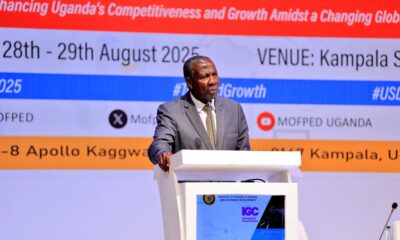Business
Uganda Brews Success in China as Coffee Exports Surge
Uganda’s coffee industry is experiencing a significant upswing, fueled by a dramatic surge in exports to China, according to a recent report from the Ministry of Agriculture.1 Between February and March, Ugandan coffee shipments to the Asian giant witnessed an astounding 190% increase, signaling a major shift in the country’s global coffee market presence.
The data reveals that in March alone, Uganda exported a substantial 35,532 60-kilogram bags of its prized coffee to China, a remarkable leap from the 12,264 bags recorded in February. This impressive growth has propelled China to become Uganda’s second-largest coffee market in Asia, surpassing Japan, and its sixth-largest globally, outstripping established European markets like Belgium and Spain.
While Robusta coffee continues to dominate Uganda’s export portfolio, the report highlights a promising trend in the growing popularity of Arabica beans. The share of Arabica in total coffee exports has steadily risen from 6.8% in January to an impressive 15% in March, indicating a diversification in the types of Ugandan coffee appealing to the Chinese palate.
The burgeoning demand has not gone unnoticed. A delegation of prominent figures from the Chinese coffee industry is scheduled to visit Uganda this month, according to Doryn Negesa, the Principal Marketing Officer for the Ministry of Agriculture in China.2 This visit will provide an opportunity for the Chinese representatives to tour Ugandan coffee farms, washing stations, and key export hubs, fostering stronger direct relationships.
Ugandan officials attribute this export triumph to a well-coordinated campaign spearheaded by Uganda’s embassy in Beijing, the consulate general in Guangzhou, and the Ministry of Agriculture. This strategic initiative aims to firmly establish Uganda as a reliable source of high-quality and sustainably produced coffee through increased participation in international trade exhibitions, specialized coffee tasting sessions designed for the Chinese market, and direct engagement with potential Chinese buyers.
“Our objective was clear from the start: make Uganda the preferred origin for high-quality, traceable coffee,” stated Negesa.
Ambassador Judyth Nsababera, Uganda’s Consul General in Guangzhou, emphasized the crucial focus on market access. “Our mission is focused on opening market pathways. We have hosted three business delegations, facilitated key B2B engagements and forged partnerships with top Chinese importers. The result is growing confidence in Uganda as a reliable and scalable coffee origin.”
Adding to this sentiment, Ambassador Oliver Wonekha highlighted symbolic milestones, noting the recent sighting of Ugandan coffee being unpacked in Zhengzhou in China’s Henan Province.3 “This is proof that when diplomacy is aligned with sector priorities, the results are tangible,” Ambassador Wonekha affirmed.
Dr. Emmanuel Iyamulemye, the former Managing Director of the Uganda Coffee Development Authority, believes that with sustained support and strategic investment, Uganda has the potential to solidify its position as China’s preferred African coffee partner.
The positive impact of this export growth is already evident in Uganda’s economic performance. According to the Finance Ministry’s March 2025 economic performance report, coffee remained Uganda’s top export, with earnings more than doubling to $167.68 million (UGX 620.42 billion) in February of this year, compared to $82.56 million (UGX 305.47 billion) in February of the previous year.4 This significant increase was attributed to both favorable international coffee prices and the substantial rise in export volumes.5 The total number of 60-kilogram bags of coffee exported also saw a considerable jump to 555,756 in February of this year, up from 434,582 bags during the same period last year.
This remarkable surge in coffee exports to China marks a promising new chapter for Uganda’s coffee industry, highlighting the success of targeted diplomatic and agricultural strategies in tapping into a significant global market.
Comments



























